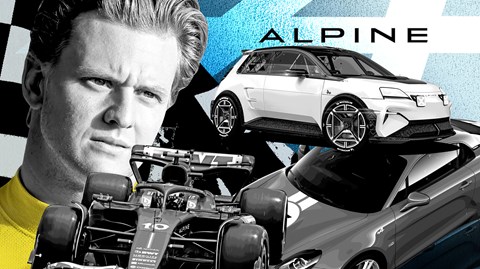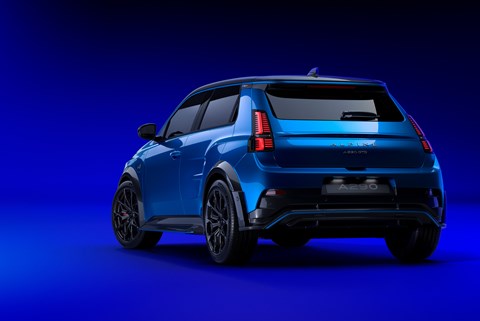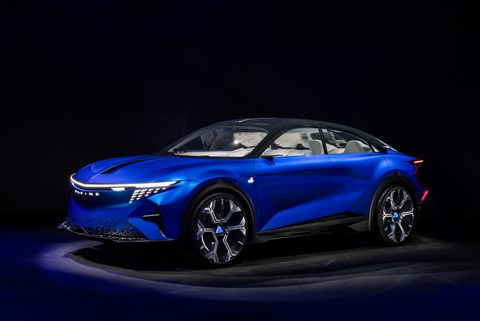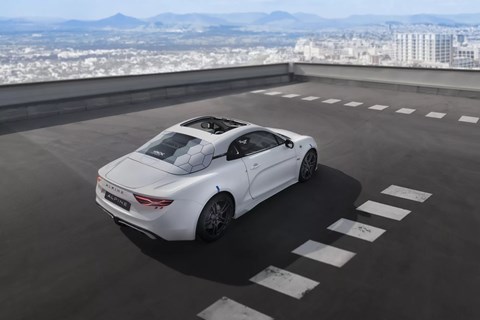► Big ambitions transforming tiny Alpine
► A290 and A390 first ‘lifestyle’ products
► Alpine Performance Platform will handle the rest
Alpine is so small, and its sole model such an infrequent sight on our roads, that you could be forgiven for forgetting that it’s a real car maker.
But not for long. Encouraged by parent company Renault, Alpine’s growth will be supercharged by a range of a new electric cars and the brand’s own ‘Alpine Performance Platform.’
That’s a lot for a boutique European sports car maker to take on. Why is it happening, and how? It starts with Renault Group chief executive Luca de Meo. In 2020 he declared that Alpine should go all-electric. (Renault and Dacia, with their bigger sales and global reach, will keep one foot in the combustion camp for longer.) One of those EVs will be an electric replacement for the A110; the others will be less niche.

‘Dieppe remains the cradle of the brand. But expansion cannot be here – the site can’t grow, says Anne-Catherine Basset, head of Alpine’s Dieppe plant. ‘When you cannot expand, you have to think of clever ways to use the space.’ She notes that in the year 2000 the plant produced a total of 25,000 Meganes and Espaces, so it can be done.
‘The transformation is a big challenge, but it means a big future for the plant. We’re aiming to be more efficient but also to go from one to two or three shifts. Producing EVs in Europe is a big challenge and we need to remain competitive [with lower-cost China]. We’re using the best of Renault production techniques, but there are some things only we do, for instance carbonfibre.’
Sovany Ang, Alpine’s vice president for product performance, spells out to us in early 2024 how this expansion into multiple EVs can maintain a credible connection with the A110.
‘We’re going to roll out the dream garage, starting with the A290. All cars will be boosted with Alpine DNA. Alpine design is going to be outlandish, and we are deploying motorsport tech which allows us to deliver the Alpine driving experience, focused on the feel of being at one with the car.’
What new electric Alpine models are on the way?
A290
The brand’s hot hatchback, that’s rather obviously used the Renault 5 as a base. The new A290, though, has plenty of Alpine-specific engineering on board, with a more powerful motor, revised suspension and steering tuning and some bespoke Alpine software.

Alpine’s vice-president for engineering, Roberto Bonetto, insists: ‘The bridge is agile driving pleasure. A110 is testimony to what we want to achieve. We have put all of our knowledge into the A290.’
The new A290 will go on sale in 2025.
A390

The brand’s first SUV, described as a ‘fastback’ and previewed by the A390_β concept that launched at the 2024 Paris motor show. The production model is scheduled for a production reveal in April 2025 and will be a Polestar 2-style crossover with five seats.
A390 will use the Renault Group’s AmpR Medium platform that’s also used on the Megane and Scenic E-Tech models. Like the A290, though, the Alpine team are doing some significant re-engineering, including offering a version that will use three electric motors. Philippe Krief, brand boss of Alpine, says at the 2024 Paris motor show: ‘it’s a very good platform, the [AmpR] Medium one, and we are adding some customisation to it.
‘The three engines are significantly different and more powerful, and then in terms of the chassis we’ve looked at the steering, suspension, brakes and tyres.’
Naturally, this will end up being Alpine’s heaviest car. ‘We’re not going to communicate the weight of the [production] car now, but we are working on the absolute weight of it,’ Krief tells CAR. ‘But it is a five-seater car with a battery and so on, which is not [usually] the feeling of lightness – but we’re happy with the results.’
‘It’s a perceived lightness that comes with this one. With the architecture, the battery is low so you can lower the centre of gravity, and we do also think that because we have three motors – one on the front, two on the rear, we can combine the yaw moments. As soon as you can generate yaw as you want, you can make the feeling of a light car.’
New-generation A110
This is the most controversial one, and the first one to use the new Alpine Performance Platform. Krief describes APP as a ‘purely native platform engineered by us,’ and is designed to fit multiple shapes of car.

Details are scarce, but Alpine says that its A110 E-ternité prototype (pictured above) has given it plenty of technological R&D time and has enabled the brand to realise making its own architecture can be cost-effective. We’ll see a new-generation electric A110 in 2026.
A310
It’s the return of Alpine’s 2+2 GT car. Like the electric A110, the A310 will take advantage of the Alpine Performance Platform but will act like more of a grand tourer to take on the Porsche 911.
Alpine has also confirmed an ‘A110-based roadster’ as well as two more cars that will the ‘D and E segments.’